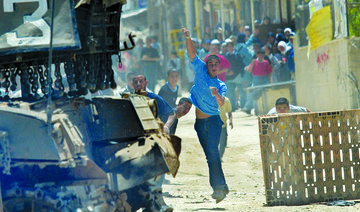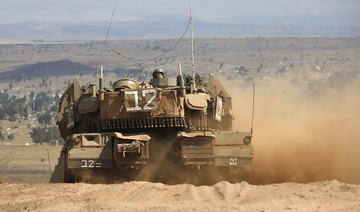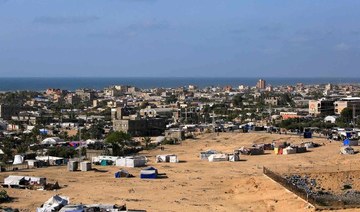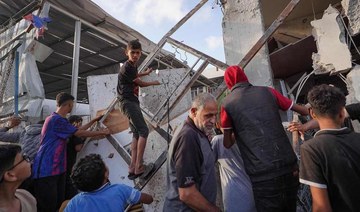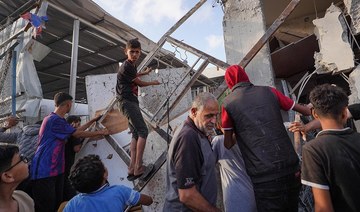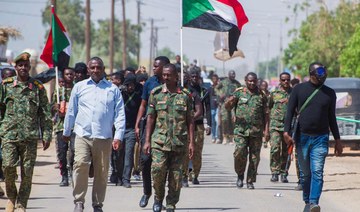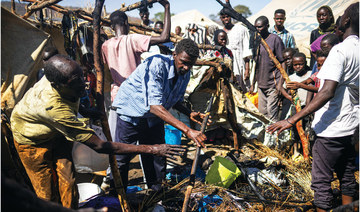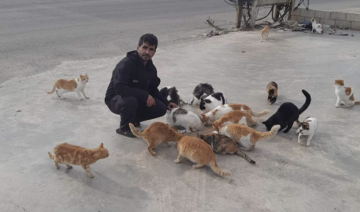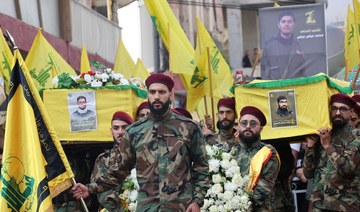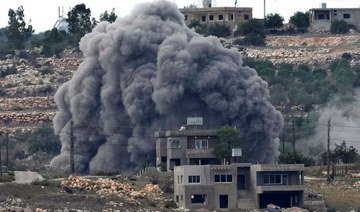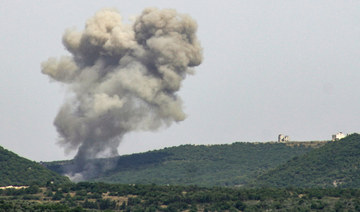GAZA: Workers have seized partial control of the headquarters of the UN agency for Palestinian refugees in Hamas-run Gaza, its head said Wednesday, accusing their union of “mutiny” over job cuts.
The United Nations Relief and Works Agency (UNRWA) announced last month more than 250 staff in Gaza and the occupied West Bank would lose their jobs, after a $300 million cut in annual funding from the United States.
The redundancies have prompted daily protests by the agency’s labor union in the enclave, which UNRWA’s Gaza head said have led to security concerns.
“They have taken over the compound where my office and other offices are,” said Matthias Schmale.
The agency’s Gaza chief admitted UNRWA does not have full control over the site, in Gaza City, explaining he has not been able to work from his own office for more than two weeks.
“I am the captain of the ship which has 13,000 sailors on it and they have basically thrown me off the bridge and consigned me to my captain’s quarters,” he told AFP, referring to the number of employees in Gaza.
UNRWA provides support for more than three million Palestinians across the Middle East, including the majority of Gaza’s two million residents.
It operates more than 200 schools in the enclave, which may not open at the start of the academic year without new funding and an end to the labor dispute.
Schmale accused the labor union of multiple incidents of “threatening and intimidating other fellow Palestinian staff. For me that crosses a red line.”
“I am very concerned about the safety and security of my Palestinian colleagues,” he added.
The union denied all allegations of intimidation and is due to continue demonstrating, with a general strike expected in the coming days unless a deal is reached.
“This is a peaceful and safe sit-in inside the regional headquarters of UNRWA to demand (employees’) right to be able to continue their work,” Amir Al-Mishal, head of the UNRWA employee union in Gaza, told AFP.
He said some of those affected by the cuts had been working for the agency for more than 30 years and they were seeking dialogue with the management.
On Wednesday the protest inside the UNRWA compound was visited by Mahmoud Zahar, a senior Hamas member, who pledged his Islamist movement’s full support for protesters, an AFP correspondent said.
Schmale was unaware that Zahar had been inside the compound, saying any visit by a figure from Hamas — considered a terrorist organization by the US and European Union — was forbidden as it breaches the UN’s impartiality rules.
A small number of employees have begun a hunger strike against the cuts outside Schmale’s office, seeking to force management to reverse course.
Ismail Al-Talaa, who worked in psychological support in a school, said he was on his fourth day without food.
He compared his salary of around $1,000 a month with what he called the huge incomes and benefits earned by Schmale and other senior UNRWA leaders, who are usually internationals.
The funding crisis was sparked in January by the United States, traditionally the largest donor to UNRWA, cutting its annual grant from $360 million to just $60 million.
’Mutiny’ at UN Palestinian agency in Gaza after job cuts
’Mutiny’ at UN Palestinian agency in Gaza after job cuts

- UNRWA’s Gaza chief says he does not have control of the agencies headquarters
- Union organizing protests after threat to 250 Palestinian jobs
Hamas-run govt media office says at least 30 killed in Israel strike near Rafah
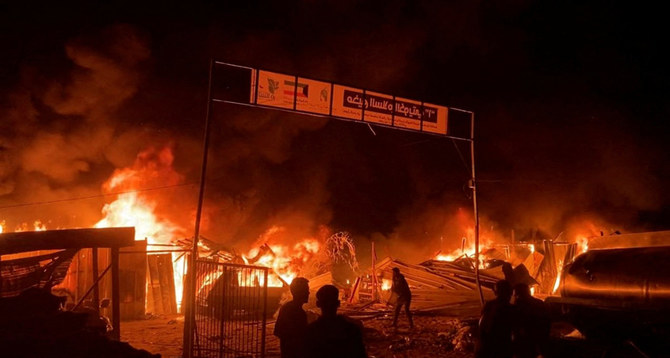
- Israeli strikes had also killed and wounded at least 50 people in the area, says Hamas
- Israel said its air force carried out strikes on Rafah in response to a Hamas rocket barrage
RAFAH, Palestinian Territories: The Hamas-run government media office in Gaza said late Sunday that at least 30 people were killed and dozens wounded in Israeli strikes on a center for displaced people near the Palestinian territory’s far-southern city of Rafah.
“The Israeli occupation committed a horrific massacre by bombarding intensively and intentionally the UNRWA’s Barkasat displacement center northwest of Rafah Governorate,” the office said in a statement, referring to the UN Palestinian refugee agency.
The strikes had “led to the death of 30 martyrs and dozens of injured,” it said.
Gaza’s civil defense agency said Israeli strikes had killed and wounded at least 50 people in the area, where it said 100,000 displaced people live.
The Israeli army said it would respond “as soon as possible” when asked for comment about the incident.
The ICRC said one of its field hospitals was receiving an “influx of casualties seeking care for injuries and burns” and reported that other hospitals were also receiving a large number of patients.
“Our teams are doing their best to save lives,” the ICRC said in a statement.
Strikes in other areas of Rafah were also reported late Sunday, with the Kuwait Specialized Hospital saying it had received the bodies of three people, including a pregnant woman.
Israel launched a ground operation on Rafah in early May despite widespread opposition over concerns for civilians sheltering there.
Earlier on Sunday, Israel’s army said at least eight rockets were fired toward central areas of the country from Rafah.
Hamas’s armed wing said in a post on Telegram it had targeted Tel Aviv “with a large rocket barrage in response to the Zionist massacres against civilians.”
Later Sunday, the Israeli military said in a statement its air force had carried out strikes on Rafah in response.
“The rocket launcher, which was situated near two mosques in the area of Rafah, was struck by the (Israeli Air Force) shortly after,” it said.
Over 100 people ‘killed in 2 weeks of fighting in Sudanese city’
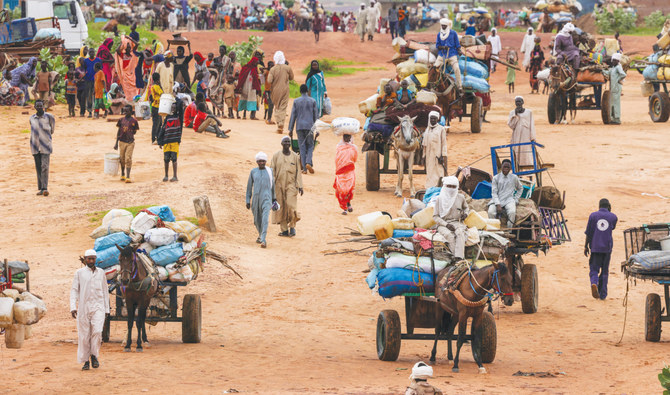
CAIRO: More than two weeks of fighting between Sudan’s military and a notorious paramilitary group over a major city in the western Darfur region killed at least 123 people, an international aid group said on Sunday.
The fighting in El-Fasher, the provincial capital of North Darfur province, also wounded more than 930 people in the same period, Doctors without Borders said.
“This is a sign of the violent intensity of the fighting,” the group said.
“We urge the warring parties to do more to protect civilians.”
Clashes between the military and the paramilitary Rapid Support Forces escalated earlier this month in the city, forcing thousands of people to flee their homes, according to the UN.
El-Fasher has become the center of the conflict between the military and the RSF, aided by militias commonly known as Janjaweed.
The city is the last stronghold held by the military in the sprawling Darfur region.
Sudan’s conflict began in April last year when soaring tensions between the leaders of the military and the RSF exploded into open fighting in the capital, Khartoum, and elsewhere in the country.
The conflict killed more than 14,000 people and wounded thousands more amid reports of widespread sexual violence and other atrocities that rights groups say amount to war crimes and crimes against humanity.
It also pushed the country’s population to the brink of famine.
The UN food agency warned the warring parties earlier this month that there is a serious risk of widespread starvation and death in Darfur and elsewhere in Sudan if they don’t allow humanitarian aid into the vast western region.
In recent months, the RSF has built up forces seeking to wrest control of El-Fasher.
Along with its militia allies, the RSF besieged the city and launched a major attack on its southern and eastern parts earlier this month.
The UN’s International Organization for Migration reported that clashes renewed on Thursday in the Abu Shouk camp for displaced people in the Salam neighborhood in the city’s northern and southern western parts.
On Saturday, a shell hit the house of a Doctors Without Borders aid worker close to the city’s main market, killing the worker, the charity said.
‘Ground trembles’ as Hezbollah launches 150 missiles in revenge strike
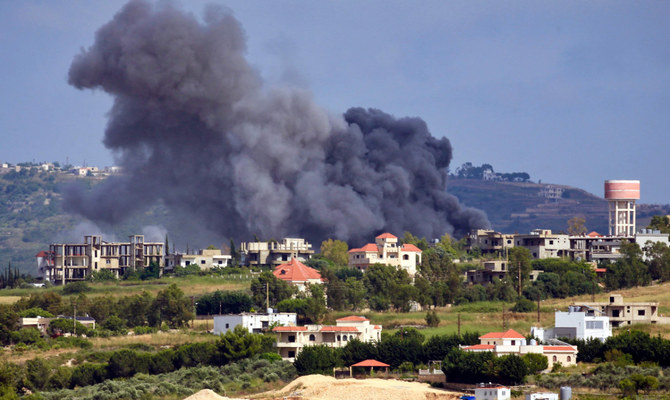
- The attacks marked a significant deterioration in the situation on the southern Lebanese border
BEIRUT: Residents of southern Lebanon’s border area took shelter late on Sunday as Hezbollah launched more than 150 missiles at targets inside Israel in one of the largest attacks since the conflict began.
“The ground trembles beneath us and the sky is covered by missiles,” one resident told Arab News.
Hezbollah’s barrage followed a series of Israeli drone strikes earlier in the day that killed at least eight of the group’s members and civilians.
Hezbollah responded by launching missiles toward Kiryat Shmona, the Golan, and military sites in the Al-Manara and Misgav Am areas.
The attacks marked a significant deterioration in the situation on the southern Lebanese border.
“These are unprecedented barrages of missiles,” the resident said.
“The area is shaking from the sounds of missiles above our heads heading toward the other side of the border. We see Iron Dome explosions above the towns all the way to the Nabatiyeh area.”
After the two deadly attacks on Naqoura and Aita Al-Shaab earlier on Sunday, the Israeli army struck a motorcycle in the town of Hula with a missile from a military drone, killing three Hezbollah members, Tariq Awad, Hussein Salman Mustafa, and Wissam Ali Hamid, whose brother was killed in an Israeli attack on the city of Bint Jbeil a few weeks ago.
The Israeli army attacked the town of Yaron in the Bint Jbeil district with two air-to-surface missiles, killing two Hezbollah members.
The towns of Aitaroun and Al-Adisa were hit by dozens of phosphorus shells, causing’ fires in several neighborhoods.
Sirens sound in Tel Aviv for the first time in months as Hamas says it fired rockets from Gaza
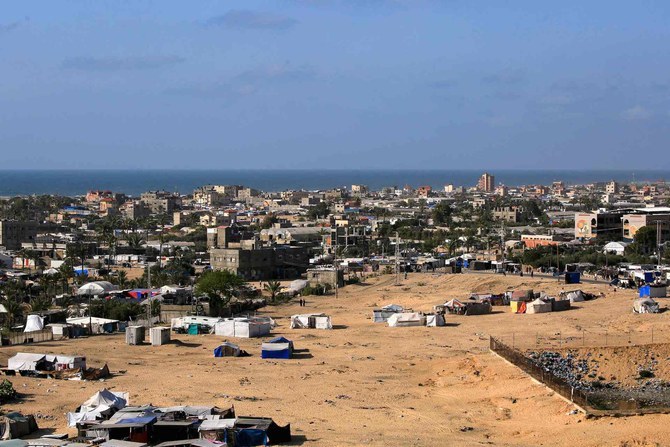
- Hamas armed wing says fired ‘large rocket barrage’ at Tel Aviv
- Aid trucks begin entering Gaza through Kerem Shalom crossing
CAIRO/TEL AVIV: Rocket sirens blared Sunday in Israel’s commercial hub of Tel Aviv for the first time in months, with at least three blasts reported across central Israel, AFP correspondents said.
The Israeli military said sirens had been activated over central Israel as fighting raged in Gaza, including in the far-southern city of Rafah.
The armed wing of Palestinian militant group Hamas said it had launched a “large rocket barrage” on Tel Aviv.
The Ezzedine al-Qassam Brigades said in a post on Telegram that they had targeted Tel Aviv “with a large rocket barrage in response to the Zionist massacres against civilians.”
There were no immediate reports of casualties or damage from the latest barrage.
Earlier on Sunday, aid trucks entered Gaza from southern Israel through a new agreement to bypass the Rafah crossing with Egypt after Israeli forces seized the Palestinian side of it earlier this month. But was unclear if humanitarian groups would be able to access the aid because of ongoing fighting in the area.
A total of “200 trucks” had moved from the Egyptian side of the Rafah border crossing, which has been shut since early May when Israel seized the Palestinian side of the terminal, to the Kerem Shalom crossing, some 4 kilometers (2.5 miles) to the south.
Egypt has refused to coordinate aid through Rafah as long as Israeli troops control the Palestinian side.
But on Friday, Egyptian President Abdel Fattah El-Sisi agreed in a call with his US counterpart Joe Biden to allow aid through Kerem Shalom, the other entry point into southern Gaza, the White House said.
Al-Qahera News did not specify how many trucks had made their way through inspection into besieged Gaza, but said “four fuel trucks” had already crossed and were heading to hospitals.
All aid from Egypt is inspected by Israeli authorities and distributed via the United Nations.
The remainder of the 200 trucks were “expected to cross into Gaza today,” Khaled Zayed, head of the Egyptian Red Crescent in Al-Arish — where the bulk of aid arrives — said.
Drones kill 3 as Israel widens southern Lebanon attacks
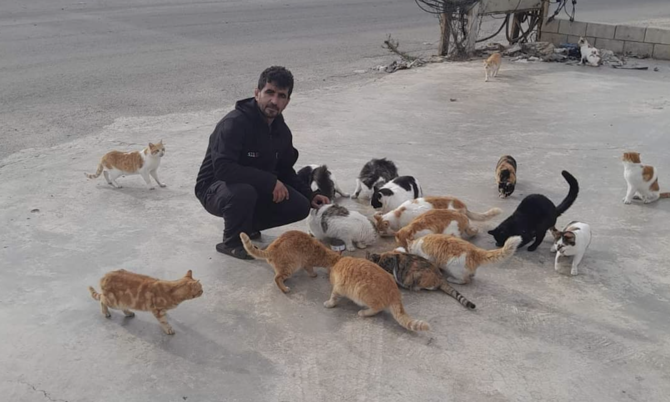
- Strike near UN peacekeeping base in Naqoura kills Hezbollah member
- ‘We are waiting for you,’ Lebanese MP says after Israeli threat of ‘open war’
BEIRUT: Three people, including two civilians, were killed in drone strikes on Sunday as the Israeli army stepped up its attacks on Hezbollah and its ally in southern Lebanon.
The first strike, near a UNIFIL site in Naqoura, killed a Hezbollah member later identified as Mohammed Baydoun.
A second Israeli drone targeted a motorcycle in Aita Al-Shaab, killing a civilian named as Rafik Hassan Kassem, and badly injuring another man, Hussein Saleh, who later died from his wounds.
Saleh, a mechanic with no political affiliations, used to travel to nearby towns to feed domestic animals left behind by owners who fled the region. Arab News had previously interviewed him.
People close to Saleh said that “everyone advised him to stop visiting border villages in fear of being targeted, but he insisted on fulfilling his humanitarian duty.”
An Israeli drone also struck Jabal Al-Blat, opposite Israel’s Zar’it settlement, targeting a transmission tower for Hezbollah’s Al-Manar TV Channel.
As hostilities between Hezbollah and Israel entered their 231st day, Khiam village was subjected to heavy Israeli raids, with military drones striking four targets.
In less than 48 hours, Israeli shelling reached the outskirts of Chihine, Majdal Zoun, Kfarhamam in Wadi Hamoul, Zebqine, and Naqoura.
Shelling subsequently reached the villages of Rachaya Al-Foukhar, Hamoul, Zebqine, Labbouneh, the Makraba forest, and the eastern outskirts of Khiam.
A fire erupted after a number of shells landed on the outskirts of Rab Al-Thalathine, near Al-Taybeh village.
Israeli raids on Aita Al-Shaab in the central sector caused serious damage to property, infrastructure and homes.
Hezbollah also announced the deaths of two people in Israeli raids on Aitaroun late on Saturday night.
One of the victims was named as Bilal Amin Mourad, a former principal in the Aitaroun public vocational school. Caretaker Minister of Education Abbas Halabi mourned Mourad’s death on Sunday.
Israeli army spokesperson Avichay Adraee said that the military struck Hezbollah targets in five regions in southern Lebanon.
He said that warplanes raided Hezbollah’s infrastructure and military buildings in Khiam and Aita Al-Shaab, adding that several areas in Khiam, Houla, Markaba and Kfarkila were also bombed.
Sirens sounded in Israeli settlements adjacent to the Lebanese border, including Shlomi, Betzet, Hanita, Ras Naqoura in western Galilee, Avivim in the upper Galilee, and Kiryat Shmona and its surroundings.
Meanwhile, missiles landed in an Israeli army site near Shlomi.
Israeli Army Radio announced that “two anti-armor missiles were launched from Lebanon toward Margaliot in the Galilee panhandle.”
The Israeli Channel 12 said “about 10 missiles were launched from Lebanon toward the Zar’it settlement in the upper Galilee, with no casualties reported.”
Hezbollah’s operations targeted “technical systems in the Israeli Al-Abad site with appropriate weapons, striking it directly and completely destroying it.”
The militant group also struck “a Merkava tank with a direct missile in the Al-Marj site, destroying it and killing and injuring its members.”
It subsequently targeted the Zibdine site in the Shebaa farms and a building for the Israeli soldiers in the Al-Manara settlement. It also hit two buildings for the Israeli soldiers in the Metula settlement and two other buildings for the Israeli soldiers in the Shtula settlement.
MP Mohammed Raad, head of Hezbollah’s parliamentary bloc, responded on Sunday to Israeli statements threatening to wage open war on Lebanon, saying: “We know your situation accurately, and we know who you are and we are waiting for you.”
In response to those criticizing the attacks in southern Lebanon in support of the Gaza Strip, Raad said: “When criminals take their crimes too far, they don’t spare anyone. That’s why we should prevent the enemy from looking for another target, so we don’t wind up being the other victims.”
Referring to the kamikaze drones used to strike Israeli targets, Sheikh Nabil Kaouk, a member of Hezbollah’s Central Council, promised further operations that will “surprise and humiliate the enemy.”
He said: “For the first time in the history of the Arab-Israeli conflict, Lebanese planes raid Israeli sites in occupied Palestine.”


